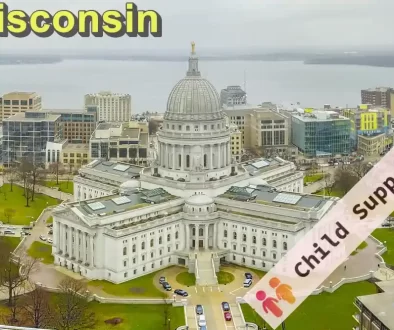Child Support in New Hampshire
The parents of a child may separate for various reasons, often leaving the cost of childcare for only one person to bear. However, every child has a right to be supported by both parents, regardless of their relationship status. Child support laws help establish legal obligations for parents to ensure that they take necessary care of their children.
Child Support Process
The custodial parents of minor children in New Hampshire can apply for child support through the Bureau of Child Support Services (BCSS), under the New Hampshire Department of Health and Human Services. The application form can be gotten from https://www.dhhs.nh.gov/dcss/documents/application-packet.pdf and must be signed after completion. Alternatively, parents can apply via email. This is done by sending a mail with the subject “Application Request” to BCSS-CIU@dhhs.nh.gov. This mail should contain the full name and mailing address of the parent as well. For parents who are receiving aid from the Temporary Assistance for Needy Families (TANF) program are automatically and compulsorily enrolled for the Child Support Program. When child support is obtained for such parents, the state withholds it as reimbursement for the TANF support paid out.
BCSS also helps parents who have an existing child support order to collect spousal support from their noncustodial counterparts.
An annual service fee of $35 is charged on all child support cases where at least $550 has been disbursed to the custodial parent. This fee, however, does not apply to parents who have ever received TANF benefits. It is important to note that the annual fee is on a per case basis, meaning that parents with more than one child support case will be charged for each order.
While filling out the child support application, the parent requesting support would have to give some details about the noncustodial parent (also known as the obligor). This includes the current relationship with that parent, the name, address, date of birth, employer, Social Security Number, income information (if available), etc. These details can help the BCSS locate the parent more easily so that the case can be established faster. The obligor’s Social Security Number is especially important because it can be used to verify income and employment information provided.
When the alleged father of the child has been located, there may be a need to establish paternity if this has not been done previously. Paternity can be established by marriage, in which case the woman’s husband is taken to be the father. In situations where the parents were not married but the man admits to being the child’s father, the parents can sign an Affidavit of Paternity, thus establishing legal fatherhood. If the man denies being the father of the child, genetic testing will have to be carried out. Genetic tests are usually paid for by the BCSS and give a result showing the probability of fatherhood. If the man is found to be the child’s father, a court order is entered to that effect, and paternity is established.
Once paternity has been established, the Bureau of Child Support Services can go about establishing the child support order as required.
Custodial parents can also modify their child support order if there has been a significant change in the financial situation of the noncustodial parent, or if the child’s needs have changed considerably. This can be done by filling the form available at https://www.dhhs.nh.gov/dcss/documents/modification.pdf.
How Do You Receive Child Support?
Parents receiving child support in New Hampshire are required to choose from either of two options for their payments. These are
- Direct Deposit: this arrangement allows the parents to receive their payments via electronic transfer into an authorized bank account. A checking or savings account may be used for this purpose. Parents who wish to register for Direct Deposit can do so by filling an Authorization Agreement which can be found at https://www.dhhs.nh.gov/dcss/documents/directdeposit.pdf and mailing “page 1” of the agreement to the Department of Health and Human Services, Office of Finance-Child Support Unit (DDP), 129 Pleasant Street, Concord, NH 03301-3857.
- New Hampshire Debit MasterCard: This is a prepaid card to which child support payments are automatically loaded as they become available. The card can be used as a regular debit card, to make withdrawals, pay for purchases, and access cashback services. This option is suitable for parents who do not have a bank account or who want to separate their child support payments from general expenses. The New Hampshire Debit MasterCard is the default option for receiving child support payments, except another option is specified.
For more information on how to receive child support payments, visit https://www.dhhs.nh.gov/dcss/payee.htm.
Child Support Calculations
The state of New Hampshire has a Child Support Guideline Table that is used to calculate the child support payments for each case. The guidelines consider the net income of both parents, the number of children, etc. Going by these guidelines, there is no fixed maximum amount that can be paid as child support. Rather, payments vary with the ability of the noncustodial parent and with the needs of the child. The Child Support Guidelines can be found at https://www.dhhs.nh.gov/dcss/documents/dcss-guide-book.pdf. A child support calculator is also hosted by the state. The aim is to give parents a general idea of how much may be awarded in their child support case. However, the exact amount varies as certain considerations may be taken by the court when establishing the order. This calculator can be accessed at https://business.nh.gov/dhhs_Calculator/.
Enforcement of Child Support
Sometimes, parents who have been ordered to pay child support may not comply with the court order. In such cases, enforcement actions may have to be taken against them. These actions include:
- License suspension and revocation: this affects professional, recreational, and driver’s licenses
- Passport denial
- Placing liens on property and accounts of the parent
- Intercepting lottery winnings
- Intercepting federal and state tax refunds
- Submitting reports to credit bureaus
- Court action: this could result in incarceration, depending on how much is owed, and for how long the parent has defaulted.
For more information, visit https://www.dhhs.nh.gov/dcss/case-enforcement.htm.




